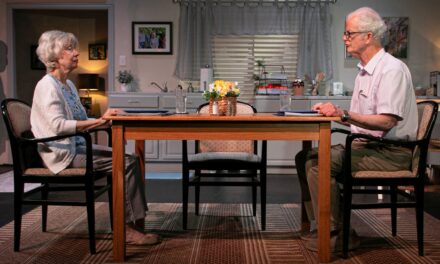As graduation comes and goes for surrounding universities, students everywhere contemplate the desolate wasteland they call “the future” and what it holds. Meanwhile, in the Hanesbrands Theatre two mail-order brides wait for their husbands, contemplating the desolate wasteland called “the West,” where dreams of their futures lie. Triad Stage‘s final Hanesbrands presentation, Beth Henley‘s Abundance is the sleeper hit of the season.
The play, set against the backdrop of the American West, spans nearly three decades in the lives of mail-order brides Bess Johnson (Roya Shanks) and Macon Hill (Amy Hamel). Bess is the more romantic of the two, dreaming of being a “good, submissive” wife to her husband, while Macon dreams of life out West, a new life of adventure and experience. They discuss how they do not want their husbands to be ugly. Suddenly, a stranger (Zachary Clark) appears. He introduces himself to Bess as her husband’s brother. He says that her husband is dead and he’s going to marry her. She complies, following him to the future. Macon’s husband (Brent A. Bateman) arrives, a stocky one-eyed lover, ready to marry. He is not what Macon imagined, but she too follows him to the future.
At home, the couples are polar opposites. Bess’ husband is prone to violent outbursts towards her while Macon’s lovable yet self-centered husband has a hard time expressing selfless love to her. During an anniversary dinner, Bess mysteriously disappears, and all assume she is gone for good, dead even. When she returns after five years, she speaks of being held captive by Indians in a tribe where she was a mother and wife. Suddenly, the future becomes cloudier for everyone and dreams of a promised future out West seem nearly impossible.
This production, presented in association with a recent production of Beth Henley’s Crimes of the Heart at Triad Stage in Greensboro, is a harrowing, effective story of friendship strong enough to overcome life’s worst disasters. Based on the script’s merits alone, Abundance may not be as deserving of entry into the American Theatre canon as Crimes, although Triad’s well-crafted production makes a case for it by highlighting the play’s strengths. Especially in its second half, the play sacrifices answering some questions about Bess’ disappearance in order to continue with a structure focusing on the friendship between the two women. Perhaps Henley does this to create an ambiguous feeling of isolation for these characters. Triad does the job of overcoming the plot holes in the second act by letting us fill them with our own imaginations. This reminds us that theatre, like memory, does not need to be 2 + 2 = 4, but instead sometimes requires us to resort to our imaginations to fill in the rest.
Thanks to the cast, this is all easy. As Bess’ husband, Zachary Clark was not sympathetic – he is not supposed to be – but rather terrifying and multi-faceted. He went above and beyond the “drunk, angry husband” trope to create a domineering behemoth of a man who gets what he deserves in Act II. Brent A. Bateman was a lovable, contradictory William Curtis, Macon’s husband. Jeremy Kuhn’s Professor is a sadly underwritten part, but he delivered his scenes with comfort.
Roya Shanks and Amy Hamel put in performances of a lifetime. Shanks’ transformation as Bess was earthshaking, shining especially in Act II, when we see how much she has changed (or has she?) since the beginning. Amy Hamel, one of the foremost powerhouse actresses in the Triad today, could do no wrong. Her performance deserved a standing ovation for the fearlessness and depth she radiated onstage.
Preston Lane‘s direction, reminiscent of telling of an old folktale, seamlessly weaves time changes and stories in and out of our minds, etching our memories and leaving us with much to think about afterwards. Robin Vest’s breathtaking set, consisting of a chalkboard floor and a backdrop of the lonely West, fills Hanesbrands and supports movement director Denise Gabriel’s choreography, which has the actors move in and out of scenes without hesitation. Along with Laura J. Eckelman’s imaginative lighting, these elements create a theatrical playground in which this story unfolds under Lane’s guidance.
The production plays like a good opera, with all elements working together in harmony and every aspect playing to its full potential. Though the play may not be as well known as Crimes of the Heart, with Abundance, Triad Stage has given us one of the year’s unexpected delights.
Abundance continues through May 17 at the Hanesbrands Theatre in Winston-Salem. See the sidebar for more details.











